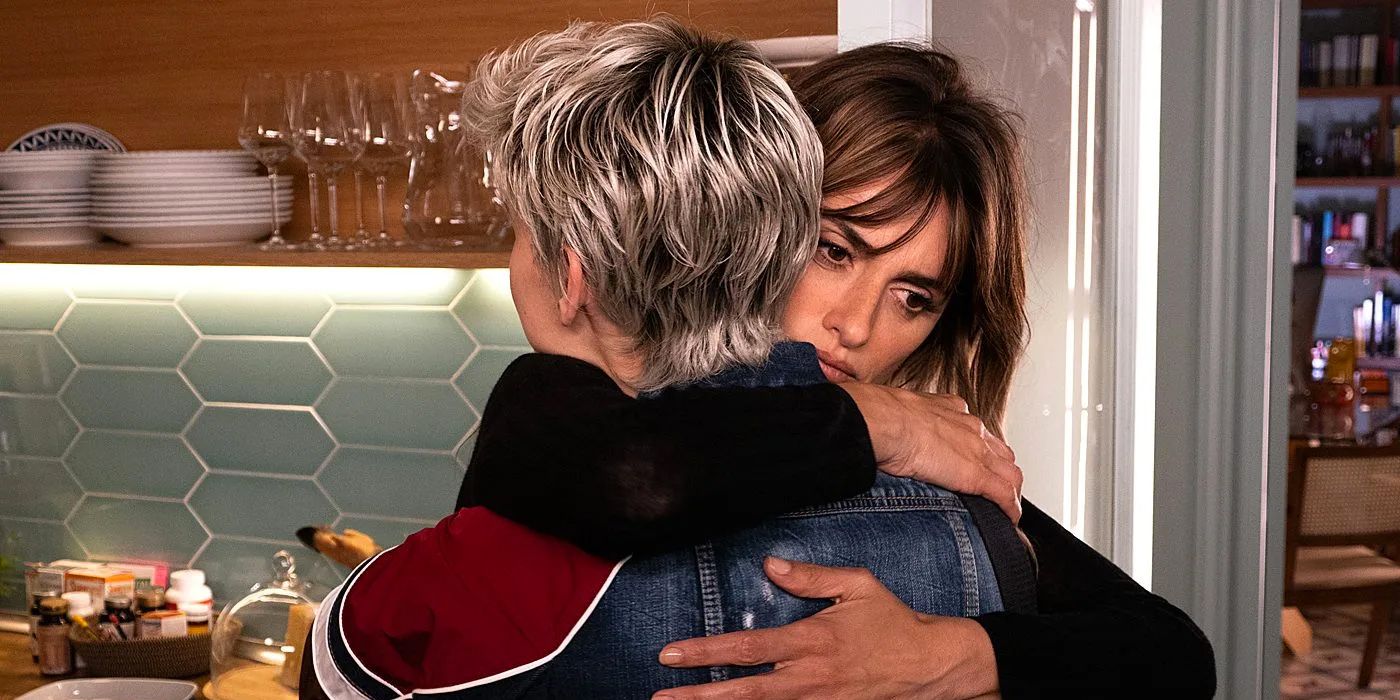Pedro Almodóvar's Parallel Mothers beautifully expresses the blissful highs and aching lows of motherhood, delicately told through the story of two single women who fatefully shared a hospital room. The Spanish film masterfully combines vivid imagery and emotional tension to create a riveting story that avoids the usual clichés, stereotypes, and other pitfalls of the genre. Disarmingly relatable and unpredictable, Parallel Mothers is an unflinching and unforgettable look at motherhood, love, and loss.
Parallel Mothers has a straightforward — if vague — premise: Janis (Penélope Cruz) and Ana (Milena Smit) come from very different walks of life, but bond over their shared experience of going into labor as single mothers. Janis is the main focus, and she faces unusual challenges as a new parent. This is further complicated when the infant's biological father, Arturo (Israel Elejalde), challenges the assumed paternity of the child. Ana, who is much younger, has her own struggles with her new role, thanks to her lack of an emotionally stable home life. In both instances, the stress of childrearing isn't the issue; rather, these parallel mothers have inner demons to contend with.
Parallel Mothers is a uniquely feminine film. With the exception of Arturo, all of the leading and supporting characters — at least those who appear onscreen — are women. The men are predominantly fifth business to the plot's main interest: mothers and the maternal experience. Fittingly, this is a deeply empathetic film that eschews manufactured conflict for a much more nuanced approach to storytelling. The initial setup and labor scenes are tastefully done, leaning into the performances rather than creating false conflict with busy camerawork or climactic music. The result is a fascinating story that feels thoroughly believable while remaining unpredictable and exciting.
Penélope Cruz is the heart and soul of Parallel Mothers. Cruz is a frequent collaborator with Pedro Almodóvar, and their familiarity shows: the director captures every subtle gesture, glance, and breath perfectly. Cruz glows as a brand new mother, but over time, has the ashen, exhausted look of a single parent struggling to keep up with the endless, and deeply tiring, responsibilities of parenthood. Milena Smit offers a satisfying counterpart to Cruz, demonstrating her own depth as an actor. The 25-year-old has a smaller role in the overall narrative, but leaves as much of an impact, proving she is a rising star to watch out for. The chemistry between the two crackles; the fact that Smit can so effortlessly share a scene with such a critically acclaimed actress without being overshadowed is an impressive feat.
Parallel Mothers was written by Almodóvar, who expertly tells the story through his thoughtful, precise direction. He takes care with each shot, filling the frame with vivid colors, textures and patterns. Every shot serves a purpose. The characters’ feelings and experiences are expertly communicated through subtle moments: how they stand, the distance between the characters, even the way the light falls on their faces, each image is a microcosm for the characters' inner lives. It’s wonderfully evocative from start to finish. One could watch without audio, without subtitles, and still be completely engrossed in the story. That isn't to say that the writing itself is lacking — rather, the writing matches the cinematography in expertise. There are many threads throughout that are gradually woven into the overall story, with every reveal — no matter how shocking — being set up previously, all while constantly defying audience expectations. It's a difficult approach to film writing, but Almodóvar pulls it off.
Where Parallel Mothers distinguishes itself, however, are its themes, which elevate the movie beyond being just a good or entertaining story. While ostensibly the feature film is about motherhood, on a deeper level, it's about shared history, fate, and legacy. Janis' relationship with Arturo begins because she needs his help settling a matter from her family's past. Ana and Janis cross paths repeatedly, completely by chance — but end up intrinsically tangled together, having bonded over a shared tragedy. While many other movies offer finite, clean resolutions, Parallel Mothers rejects that notion, instead, arguing that events from the past can define our futures in unpredictable ways. It's a mature message for audiences, and is part of what makes Parallel Mothers such a unique and charming film.
Parallel Mothers is 123 minutes long and is rated R for some sexuality.



